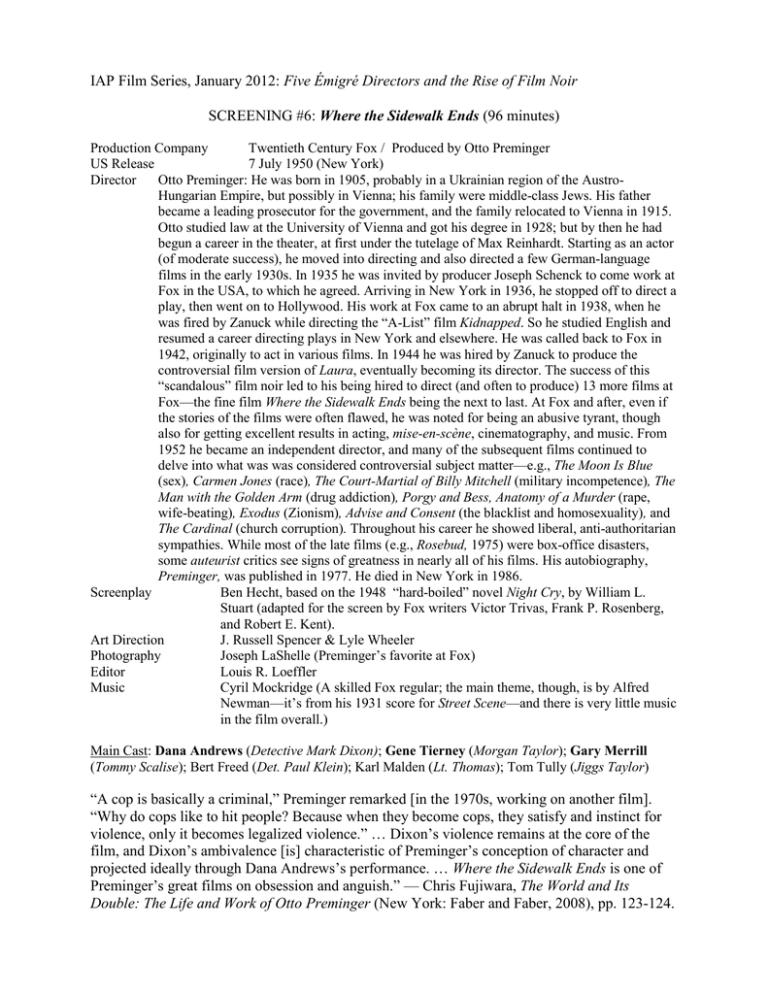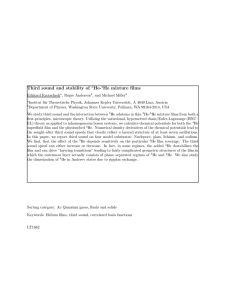
IAP Film Series, January 2012: Five Émigré Directors and the Rise of Film Noir
SCREENING #6: Where the Sidewalk Ends (96 minutes)
Production Company
Twentieth Century Fox / Produced by Otto Preminger
US Release
7 July 1950 (New York)
Director
Otto Preminger: He was born in 1905, probably in a Ukrainian region of the AustroHungarian Empire, but possibly in Vienna; his family were middle-class Jews. His father
became a leading prosecutor for the government, and the family relocated to Vienna in 1915.
Otto studied law at the University of Vienna and got his degree in 1928; but by then he had
begun a career in the theater, at first under the tutelage of Max Reinhardt. Starting as an actor
(of moderate success), he moved into directing and also directed a few German-language
films in the early 1930s. In 1935 he was invited by producer Joseph Schenck to come work at
Fox in the USA, to which he agreed. Arriving in New York in 1936, he stopped off to direct a
play, then went on to Hollywood. His work at Fox came to an abrupt halt in 1938, when he
was fired by Zanuck while directing the “A-List” film Kidnapped. So he studied English and
resumed a career directing plays in New York and elsewhere. He was called back to Fox in
1942, originally to act in various films. In 1944 he was hired by Zanuck to produce the
controversial film version of Laura, eventually becoming its director. The success of this
“scandalous” film noir led to his being hired to direct (and often to produce) 13 more films at
Fox—the fine film Where the Sidewalk Ends being the next to last. At Fox and after, even if
the stories of the films were often flawed, he was noted for being an abusive tyrant, though
also for getting excellent results in acting, mise-en-scène, cinematography, and music. From
1952 he became an independent director, and many of the subsequent films continued to
delve into what was was considered controversial subject matter—e.g., The Moon Is Blue
(sex), Carmen Jones (race), The Court-Martial of Billy Mitchell (military incompetence), The
Man with the Golden Arm (drug addiction), Porgy and Bess, Anatomy of a Murder (rape,
wife-beating), Exodus (Zionism), Advise and Consent (the blacklist and homosexuality), and
The Cardinal (church corruption). Throughout his career he showed liberal, anti-authoritarian
sympathies. While most of the late films (e.g., Rosebud, 1975) were box-office disasters,
some auteurist critics see signs of greatness in nearly all of his films. His autobiography,
Preminger, was published in 1977. He died in New York in 1986.
Screenplay
Ben Hecht, based on the 1948 “hard-boiled” novel Night Cry, by William L.
Stuart (adapted for the screen by Fox writers Victor Trivas, Frank P. Rosenberg,
and Robert E. Kent).
Art Direction
J. Russell Spencer & Lyle Wheeler
Photography
Joseph LaShelle (Preminger’s favorite at Fox)
Editor
Louis R. Loeffler
Music
Cyril Mockridge (A skilled Fox regular; the main theme, though, is by Alfred
Newman—it’s from his 1931 score for Street Scene—and there is very little music
in the film overall.)
Main Cast: Dana Andrews (Detective Mark Dixon); Gene Tierney (Morgan Taylor); Gary Merrill
(Tommy Scalise); Bert Freed (Det. Paul Klein); Karl Malden (Lt. Thomas); Tom Tully (Jiggs Taylor)
“A cop is basically a criminal,” Preminger remarked [in the 1970s, working on another film].
“Why do cops like to hit people? Because when they become cops, they satisfy and instinct for
violence, only it becomes legalized violence.” … Dixon’s violence remains at the core of the
film, and Dixon’s ambivalence [is] characteristic of Preminger’s conception of character and
projected ideally through Dana Andrews’s performance. … Where the Sidewalk Ends is one of
Preminger’s great films on obsession and anguish.” — Chris Fujiwara, The World and Its
Double: The Life and Work of Otto Preminger (New York: Faber and Faber, 2008), pp. 123-124.
© Faber and Faber. All rights reserved. This content is excluded from our Creative Commons
license. For more information, see http://ocw.mit.edu/fairuse.
MIT OpenCourseWare
http://ocw.mit.edu
CMS.S61 Special Subject: The Rise of Film Noir
January IAP 2012
For information about citing these materials or our Terms of Use, visit: http://ocw.mit.edu/terms.




